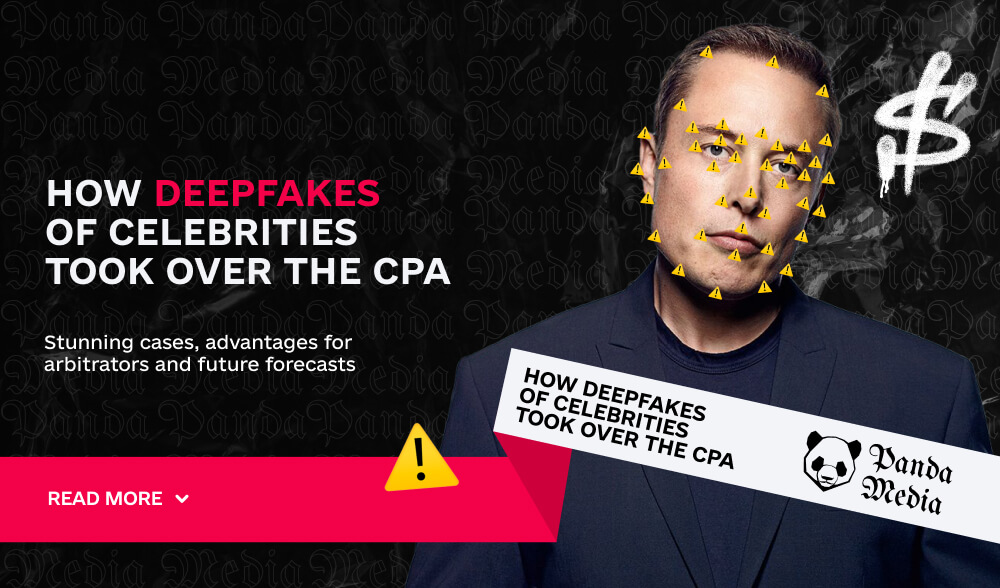Don't miss interesting news

Want Elon Musk to advertise your niche production of designer furniture for only $200 or Keanu Reeves to urge you to hurry up and buy a rejuvenation product for only $500? Easy! Now it’s a reality.

Traffic arbitrage and the CPA industry are not only based on a dry calculation focused on customer acquisition. Creating profitable advertising resembles a competition of “creative brains” – whoever is more creative takes the prize. After all, the content should interact with the user, evoke powerful emotions and reflection after viewing, and be sure to be imprinted in the memory. Face Swapping or Deepfake is a face replacement technology that has dramatically changed the advertising market and brought huge profits to its developers. However, there are also significant disadvantages of this technology that can lead to unexpected consequences.
So, let’s analyze all the pros and cons of using showbiz stars’ deepfakes in traffic arbitrage.
Recently, the real estate investment startup reAlpha Tech Corp presented a marketing video featuring Elon Musk. A month earlier, Tom Cruise and Leonardo DiCaprio appeared in a video for the Defense Ministry’s technology development company Paperspace.
Of course, Musk, Cruise, and DiCaprio did not participate in the filming. Moreover, they did not even know about these companies. The videos were created with the help of deepfake technology, which uses computer images to make movies and business stars say and do things they don’t even know they are doing.
Sohistorically, the word “deepfake” does not have a very positive reputation and is associated not as an achievement of cutting-edge technology, but rather as provocative and fake material. If it falls into the hands of provocateurs and ill-wishers, a deepfake can become a kind of weapon of mass destruction and can hit society hard on its sore spots. There have already been unpleasant incidents, and a professor at New York University even published a report in which the deepfake was ranked as one of the main threats of disinformation in 2020.
“It’s hard enough for us to fight fake information. Now some deepfakes look even more believable,” says Ari Lightman, professor of digital media and marketing.
But while most people persist in making this technology a scary monster of the twenty-first century, we suggest looking at it from the other side, because the situation is different for arbitration. When developing a landing page with a story on behalf of a star, a webmaster does not negotiate with the celebrity and does not enter into an agreement or contract. They simply take a photo or video with a famous personality or can make a deepfake of the video or even voice it with the star’s voice (for example, using the Uberduck neural network).
There are several advantages of such one-sided “cooperation” for the arbitrator:
But let’s not forget about a rather significant “fly in the ointment”.
The obvious risks associated with dipshots are the availability of technology and the fantastic believability of images and videos.
If a celebrity sees himself or herself in an advertisement for a dubious drug, for example, for baldness or weight loss, he or she can easily sue. It is unlikely that the arbitrageur will be sued, as he is hidden behind proxies and anti-detection browsers. However, the owner of the brand of this drug, i.e. the manufacturer-advertiser, will be subpoenaed. The company will be in big trouble and face fines.
But even in such a situation, a smart and resourceful arbitrator will get away with it. For example, the video with Elon Musk by reAlpha contains a warning that it is a parody. The same principle was used by creators to circumvent the law in last year’s reAlpha video, where the Tesla CEO’s dipshit sits in a bubble bath and explains the concept of Regulation A+ investment or equity crowdfunding.
Experts believe that the popularity of celebrity endorsements in the CPA industry will only grow. After all, technology allows brands and agencies to create even more content for a minimum amount of time and budget.
“In six months, we created 10 different creatives and concepts with digital Bruce Willis, working with different directors,” says a representative of Deepcake, one of the largest deepfake labs. “It’s hard to imagine such productivity with a real actor.”
It is up to you to use the deepfakes of famous personalities in the CPA field or not. But it is worth remembering that the Internet does not stand still. Its possibilities are endless, so don’t be afraid to use creative tools and creativity to the maximum. Perhaps you will be the one who will take the digital experience to the next level.